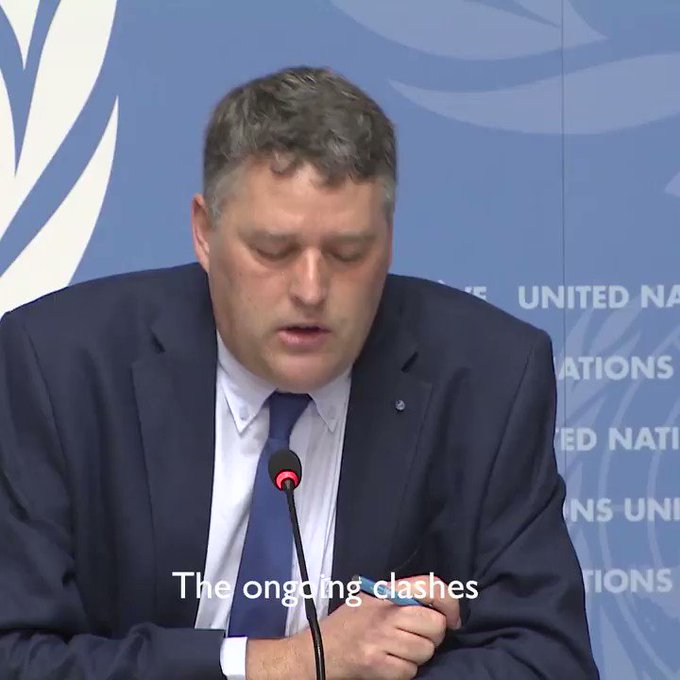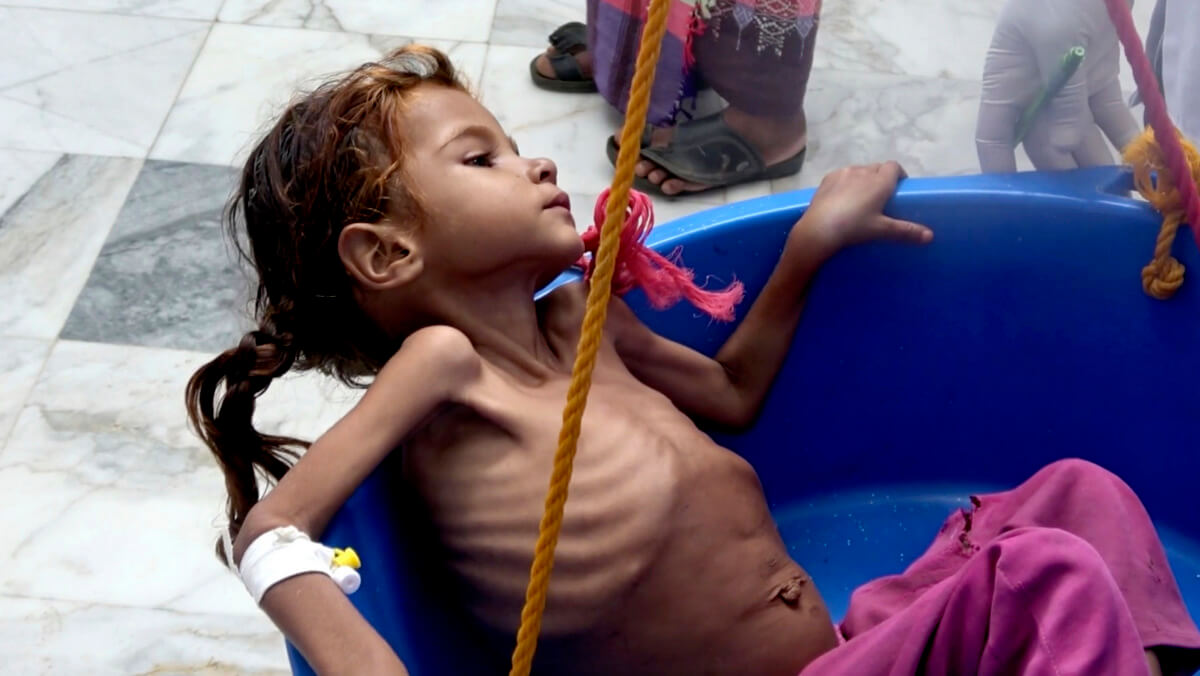After Peace Talks Fail, Saudi Coalition Reverts to Scorched-Earth Campaign Against Civilians in Yemen
M.A.
HODEIDA, YEMEN — Not long after UN-brokered peace talks between Yemen and the Saudi coalition in Geneva failed last week, the Saudi-led coalition renewed its offensive to capture Yemen’s strategic port of Hodeida. The attacks targeted internally displaced persons, vital facilities and infrastructure– continuing a scorched earth campaign that has left scores of dead civilians in its wake.
“Please doctor, save my mother, she will die!” begged nine-year-old Mohammed as he and his brother Amran stared at their dead mother, who died from injuries sustained when a Saudi airstrike hit their family car Friday on the highway between Hodeida and Sana’a in the Kilo 16 district on the outskirts of Hodeida. The family was attempting to flee to Sana’a.
Lying in blood-stained clothing on a bed in Hodeida Hospital’s emergency room, Mohammed, who hung on to his mother’s purse despite the shrapnel in his hand, recounted the events which led him there:
We were moving furniture from our home in Kilo 16 to the truck. When a bomb suddenly hit us. My mother was killed and I, my brother and sister were wounded.”
At least 10 civilians, including women and children, were killed and dozens injured by Saudi-led coalition airstrikes in Hodeida and Sadaa on Friday. Just two days prior, coalition aircraft bombed Hodeida’s Kilo 16 district, killing 15 civilians and injuring dozens more, most of whom were hit when they were forced to flee down the only road that links Sana’a and Hodeida.
The deadly attacks come after U.S. Secretary of State Mike Pompeo defended the Saudi coalition following international pressure after the coalition targeted a school bus full of children.
In a written memo, Pompeo ‘certified’ that the Gulf monarchies waging the war in Yemen were taking “sufficient steps to protect civilians.”
The governments of Saudi Arabia and the United Arab Emirates are undertaking demonstrable actions to reduce the risk of harm to civilians and civilian infrastructure resulting from military operations of these governments.”
Despite Pompeo’s statements, attacks on civilians show little sign of abatement
In another fresh attack by the U.S.-backed coalition, ten civilians including women and children were killed when Saudi airstrikes targeted their family home in the village of Hwara in the Ganiyah district on Monday. Three journalists and a guard were also killed when Saudi airstrikes targeted the Hodeida Radio building Sunday, and two were people were killed and one severely injured after a fishing boat off the island of Al-Sawaba was targeted on Saturday.
The worst may be yet to come
Five hundred meters south of Kilo 16, where Mohammed family was hit, local mercenaries employed by the Saudi coalition shelled a United Nations World Food Program (WFP) food silo inside the Yemen Company for Flour Mills and Silos (YCFMS).
The UN food storage facility held large quantities of wheat for the WFP and was responsible for milling about a quarter of the wheat flour the agency distributes to some of the hungriest people in the country, according to the UN.
Humanitarian workers, infrastructure and food supplies have been targeted in recent days, as clashes are still ongoing near the Red Sea Mills silos, a critical facility for WFP operations. A mortar shell launched by an unidentified armed group also hit a WFP warehouse in Hodeida city, holding enough food to assist 19,200 people, wounding a guard at the warehouse. The fighting could impact WFP’s ability to supply up to 3.5 million people in dire need in northern and central Yemen for a month.”
Earlier, the chairman of Ansar Allah`s (Houthi’s) Supreme Revolutionary Committee, Mohammed Ali al-Houthi, warned in a Twitter post that Riyadh had plans to attack food storage facilities and silos across Hodeida under the false pretext that they were being used to store weapons.
The Ministry of Public Health and Population, based in Sana’a, also warned in a statement that the Saudi-led coalition wanted to target UNICEF food stores and World Food Program grain silos in Hodeida, to “push Yemenis to starvation by various means.”
This comes amidst a worsening famine in Yemen which has left thousands of families in many provinces, including Hodeida, with nothing to eat, leaving some to resort to eating the leaves off of trees in an attempt to stave off starvation.
Fleeing becomes almost impossible
Like hundreds of families, Mohammed lost his mother when they were driving the Kilo 16 thoroughfare linking the port city of Hodeida to the capital, Sana’a. Serving as the only major road to Sana’a, the thoroughfare has left civilians exposed to deadly coalition attacks as they attempt to flee the fighting in Hodeida.
The road has been difficult to traverse since June 13, when forces from Saudi Arabia and the United Arab Emirates launched a wide-ranging operation to capture Hodeida’s strategic seaport. With airports closed thanks to a coalition blockade, there are no humanitarian corridors to allow civilians to flee or ambulance crews to transport the wounded to Sana’a. The coalition has also blocked internet access across most of Hodeida, making it almost impossible for residents to contact the outside world.
The coalition claims its attacks on the Kilo 16 thoroughfare are intended to cut off the Houthis’ main supply route but have provided no evidence to back their claim. The Houthis likely do not rely on the asphalt road where they could easily be spotted and targeted by coalition aircraft.
The fighting for Hodeida has effectively shut down the main artery linking the port city to the rest of the country, Save the Children charity said Thursday.
This year alone we expect some 400,000 children under five to suffer from severe acute malnutrition … Unless supply routes remain open this figure could increase dramatically, putting the lives of thousands of children at risk from entirely preventable causes.”
For its part, the Norwegian Refugee Council (NRC) has called for the port of Hodeida and the arteries that lead to and from it to remain open. NRC spokesman Jan Engelan said:
Hodeida is not a trophy and its citizens are not toys … A single act of force to disrupt the flow of supplies from Hodeida would be a deadly blow for millions.”
In Hodeida, No guarantee of safety
UN humanitarian coordinator, Lise Grande, said in a statement on Thursday:
The situation has deteriorated dramatically in the past few days. Families are absolutely terrified by the bombardment, shelling and airstrikes, as the lives of 300,000 inhabitants hang in the balance in the port city.”
Indeed, a family who refused to flee Hodeida were targeted by a Saudi coalition airstrike on Friday, leaving one family member dead and many others wounded. The family, who resided in Hodeida’s al-Zurah district, didn’t have the means to escape the fighting and feared airstrikes targeting the roads leaving Hodeida.
International human rights groups say Saudi Arabia has committed war crimes by using unconventional weapons, conducting hundreds of airstrikes on residential areas, and hitting civilian targets across Yemen.
Death from above & everywhere else
Back in Hodeida Hospital’s emergency room, doctors struggle to save Mohammed and Amran after their family car was targeted in a coalition airstrike while trying to flee Hodeida via the Kilo 16 thoroughfare. The boys, both in a great deal of pain owing to serious injuries to their heads, hands and back, risk death from the chronic shortage of medical supplies in Yemen owing to a complete Saudi coalition blockade of the countries airports, seaports and roads. The blockade has been in effect since the coalition campaign began in 2015.
To make matter worse, over 1,250 days of near-constant airstrikes by the Saudi-led coalition have reduced Yemen`s hospitals and clinics to rubble and short-circuited its electricity service, while the ruinous blockade has depleted the country’s supply of food and life-saving medicine.
A severely malnourished girl is weighed at the Aslam Health Center in Hajjah, Yemen, Aug. 25, 2018. Hammadi Issa | AP






